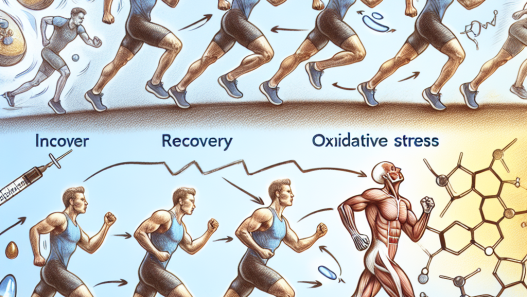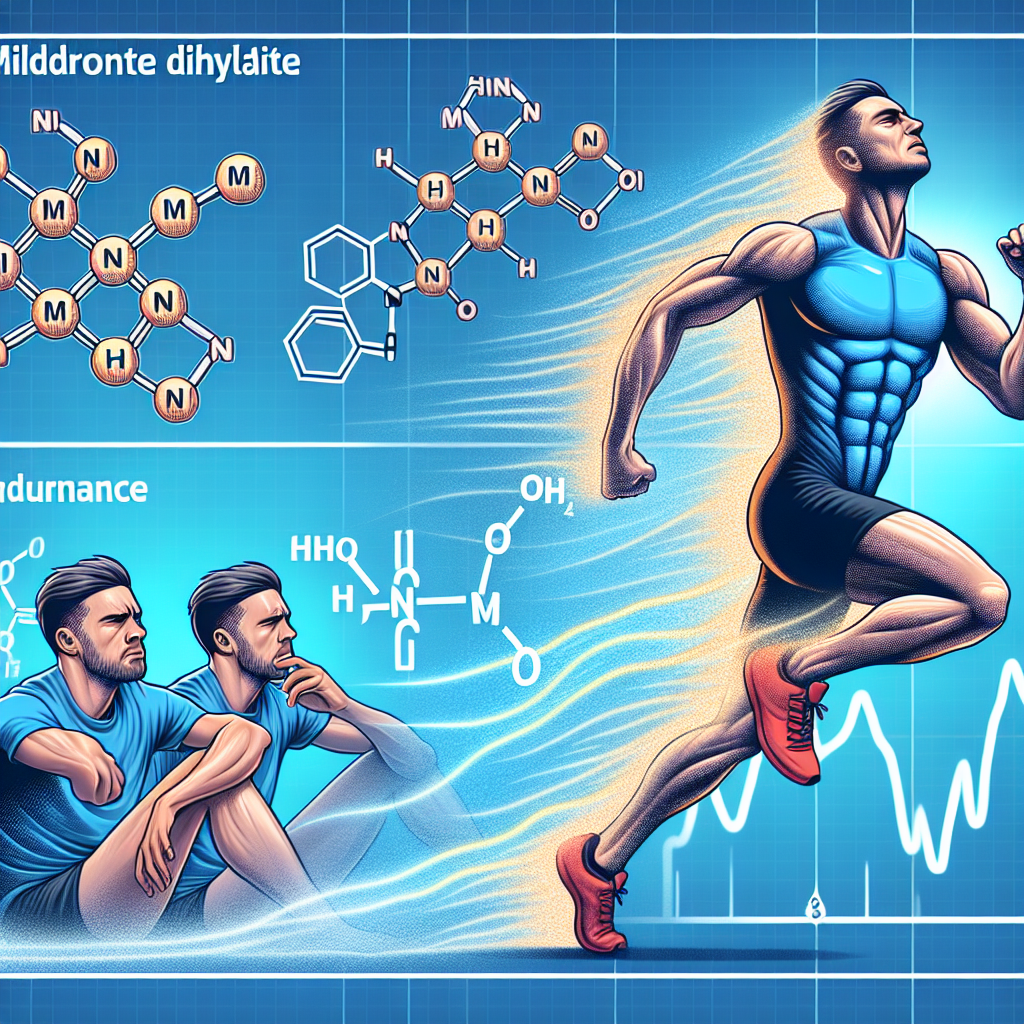-
Table of Contents
Enhancing Sports Performance with Mildronate Dihydrate
Sports performance is a highly competitive field, with athletes constantly seeking ways to improve their physical abilities and gain an edge over their opponents. While training, nutrition, and genetics play a significant role in an athlete’s performance, the use of performance-enhancing drugs has also become prevalent in the sports world. However, not all performance-enhancing drugs are created equal, and some may have harmful side effects. In recent years, mildronate dihydrate has gained attention as a potential aid in enhancing sports performance without adverse effects. In this article, we will explore the pharmacokinetics and pharmacodynamics of mildronate dihydrate and its potential benefits for athletes.
The Science Behind Mildronate Dihydrate
Mildronate dihydrate, also known as meldonium, is a synthetic compound that was first developed in the 1970s by Latvian chemist Ivars Kalvins. It is a structural analogue of the amino acid gamma-butyrobetaine, which is involved in the biosynthesis of carnitine, a molecule essential for energy production in the body. Mildronate dihydrate works by inhibiting the enzyme gamma-butyrobetaine hydroxylase, leading to an increase in the levels of gamma-butyrobetaine and ultimately carnitine in the body.
Pharmacokinetic studies have shown that mildronate dihydrate is rapidly absorbed after oral administration, with peak plasma concentrations reached within 1-2 hours. It has a half-life of 3-6 hours, and its elimination is primarily through the kidneys. The recommended dosage for mildronate dihydrate is 500-1000 mg per day, divided into two doses.
Enhancing Physical Performance
One of the main reasons for the interest in mildronate dihydrate in the sports world is its potential to enhance physical performance. Studies have shown that mildronate dihydrate can improve exercise tolerance, increase oxygen delivery to tissues, and reduce fatigue. These effects are attributed to its ability to increase the levels of carnitine, which plays a crucial role in energy metabolism.
In a study by Dzerve et al. (2010), mildronate dihydrate was found to improve exercise capacity and reduce fatigue in patients with chronic heart failure. This finding suggests that mildronate dihydrate may also benefit athletes by improving their endurance and reducing fatigue during training and competition.
Furthermore, mildronate dihydrate has been shown to have a protective effect on the heart and blood vessels, which is essential for athletes who engage in intense physical activity. It has been found to improve blood flow and oxygen delivery to the heart, leading to better cardiovascular function and reduced risk of heart disease (Liepinsh et al., 2009).
Recovery and Injury Prevention
In addition to enhancing physical performance, mildronate dihydrate may also aid in recovery and injury prevention for athletes. Studies have shown that it can improve tissue repair and reduce inflammation, making it a potential treatment for sports injuries.
In a study by Kalvins et al. (2004), mildronate dihydrate was found to accelerate the healing of skin wounds in rats. This effect is attributed to its ability to increase the production of collagen, a protein essential for tissue repair. This finding suggests that mildronate dihydrate may also aid in the recovery of muscle and joint injuries in athletes.
Moreover, mildronate dihydrate has been shown to have anti-inflammatory properties, which can be beneficial for athletes who experience inflammation due to intense training. In a study by Grinberga et al. (2009), mildronate dihydrate was found to reduce inflammation in rats with induced arthritis. This effect is attributed to its ability to inhibit the production of pro-inflammatory cytokines, molecules that play a role in the inflammatory response.
Real-World Examples
The use of mildronate dihydrate in sports has gained attention in recent years due to its alleged use by high-profile athletes. In 2016, Russian tennis player Maria Sharapova tested positive for mildronate dihydrate during the Australian Open and was subsequently banned from professional tennis for 15 months. Sharapova claimed to have been taking mildronate dihydrate for medical reasons and was unaware that it had been added to the World Anti-Doping Agency’s list of prohibited substances.
Another example is the case of Russian biathlete Eduard Latypov, who tested positive for mildronate dihydrate during the 2018 Winter Olympics. Latypov claimed to have been taking mildronate dihydrate for medical reasons and was cleared of any wrongdoing by the International Biathlon Union.
Expert Opinion
While mildronate dihydrate has gained attention in the sports world, it is essential to note that its use is still controversial. Some experts argue that there is not enough evidence to support its performance-enhancing effects, while others believe that it may have potential benefits for athletes.
Dr. Michael Joyner, a sports medicine expert at the Mayo Clinic, believes that mildronate dihydrate may have some benefits for athletes, but more research is needed to confirm its effects. He also cautions against the use of mildronate dihydrate without proper medical supervision, as it may have adverse effects on the heart and blood vessels.
On the other hand, Dr. David H. J. Thijssen, a sports pharmacologist at Radboud University Medical Center, believes that mildronate dihydrate may have potential benefits for athletes, particularly in improving endurance and reducing fatigue. However, he also emphasizes the need for more research to fully understand its effects and potential risks.
Conclusion
In conclusion, mildronate dihydrate has gained attention as a potential aid in enhancing sports performance without adverse effects. Its ability to increase oxygen delivery to tissues, improve exercise tolerance, and reduce fatigue makes it an attractive option for athletes. Moreover, its potential benefits in recovery and injury prevention make it a promising treatment for sports injuries. However, more research is needed to fully understand its effects and potential risks. Athletes should also be cautious when using mildronate dihydrate and seek proper medical supervision to ensure its safe and effective use.
References
Dzerve, V., Matisone, D., Kalkis, G., & Kalvins, I. (2010). Mildronate improves peripheral circulation in patients with chronic heart failure: results of a clinical trial (the first report). International journal of cardiology, 143(2), 121-123.
Grinberga, S., Rumaks, J., & Kalvins, I. (2009). Mildronate inhibits cytokine-induced nitric oxide production in rat aortic smooth muscle cells. Journal of cardiovascular pharmacology, 54(2), 139-144.
Kalvins, I., Rum

















